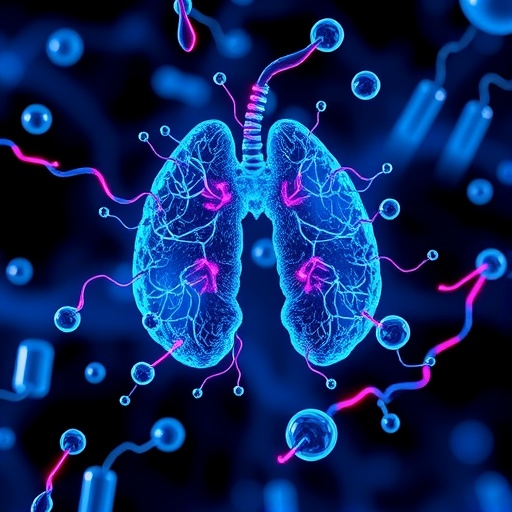A groundbreaking study conducted by researchers at the University of Bath has unveiled two novel families of drug molecules with the potential to revolutionize tuberculosis treatment. Tuberculosis (TB), a deadly disease caused by the bacterium Mycobacterium tuberculosis, remains the second most lethal infectious killer worldwide, surpassed only by Covid-19. Annually, TB claims approximately 1.3 million lives and continues to present significant challenges to global health, particularly among vulnerable populations such as people living with HIV and those in lower-income regions. The urgency to develop new therapies has never been greater, given the increasing incidence of multi-drug resistant strains that resist current regimens.
The University of Bath team focused their efforts on an enzyme intrinsic to M. tuberculosis survival, known scientifically as alpha-methylacyl-CoA racemase (MCR). This enzyme plays a critical biochemical role by enabling the bacterium to metabolize cholesterol, a crucial energy source within the host environment. Since cholesterol catabolism is vital for the pathogen’s persistence and virulence, targeting MCR offers a promising strategy to starve the bacterium, thereby crippling its infectious capabilities. The researchers employed cutting-edge experimental techniques to characterize the interaction between MCR and potential inhibitory molecules derived from two newly identified chemical families.
Using high-resolution X-ray crystallography, the team resolved the three-dimensional structures of MCR both in its apo form and complexed with these candidate compounds. This granular structural insight allowed them to visualize precisely how these molecules bind within the enzyme’s active site, revealing unexpected features that challenge previous models of MCR’s mechanism of action. The researchers discovered subtle conformational rearrangements and key binding interactions that facilitate potent inhibition, opening opportunities to refine these molecules or develop entirely new inhibitors with enhanced affinity and specificity.
.adsslot_CthvBuZGk0{ width:728px !important; height:90px !important; }
@media (max-width:1199px) { .adsslot_CthvBuZGk0{ width:468px !important; height:60px !important; } }
@media (max-width:767px) { .adsslot_CthvBuZGk0{ width:320px !important; height:50px !important; } }
ADVERTISEMENT
Moreover, this research holds profound implications beyond tuberculosis. The enzyme MCR in M. tuberculosis shares functional similarities with the human homolog alpha-methylacyl-CoA racemase (AMACR), a protein increasingly recognized as a therapeutic target in oncology, particularly prostate and other cancers. Despite its clinical relevance, the AMACR human enzyme has remained structurally elusive, hampering drug discovery efforts. Insights gleaned from the bacterial MCR structure can illuminate the mechanistic principles underpinning AMACR activity, potentially guiding future anti-cancer strategies.
Dr. Matthew Lloyd, Senior Lecturer at the University of Bath’s Department of Life Sciences, emphasized the importance of these findings: “For the first time, we have a detailed understanding of how these compounds interact with the MCR enzyme, along with quantitative measures of their binding strength. This represents a crucial advance in our capacity to inhibit MCR function effectively.” Such knowledge directly informs the strategic design of next-generation inhibitors that may complement or enhance existing TB therapeutics.
The collaboration between structural biology experts and biochemical pharmacologists at the University of Bath, led by Professor Ravi Acharya, synthesized their expertise to achieve these breakthrough results. Professor Acharya noted, “We now possess a precise molecular handle on which inhibitors warrant further exploration and optimization. Our next goal is to systematically screen a large library of similar molecules to identify those with superior inhibitory profiles.” This integrative approach underscores the value of combining structural and functional studies in drug development pipelines.
The research is particularly timely given the growing global burden of drug-resistant TB, which complicates treatment, prolongs illness, and elevates mortality. The complexity and toxicity of current regimens often lead to poor compliance and treatment failure, exacerbating resistance issues. By introducing novel inhibitors that disrupt essential metabolic pathways in M. tuberculosis, this research could catalyze the creation of more effective, targeted, and less toxic therapeutic options, potentially transforming patient outcomes worldwide.
Behind the scientific achievements lies a notable international dimension: this work was supported by PhD funding from the Department of Tertiary Education & Financing (DTEF) of the Government of Botswana, exemplifying global collaboration in addressing pressing health challenges. The study represents two decades of sustained partnership between Acharya and Lloyd, highlighting the value of long-term interdisciplinary cooperation in advancing biomedical frontiers.
Future directions for the team include the investigation of how various chemical modifications influence compound binding to MCR, aiming to unravel the structure-activity relationships that govern inhibitor potency and specificity. Such endeavors will leverage the detailed structural framework established, facilitating the rational design of molecules with optimized pharmacological characteristics suited for clinical development.
In summary, this pioneering University of Bath study not only breaks new ground in understanding the molecular basis of enzyme inhibition crucial to Mycobacterium tuberculosis metabolism but also opens promising avenues for the development of novel antitubercular drugs. The dual relevance to cancer biology through the human enzyme AMACR further enhances the impact of this work, potentially benefiting multiple fields of medicine. As tuberculosis continues to pose a significant global health threat, especially in resource-limited settings, such innovative research efforts are vital to curbing its devastating toll.
Subject of Research: Not applicable
Article Title: Molecular basis of acyl-CoA ester recognition by α-methylacyl-CoA racemase from Mycobacterium tuberculosis
News Publication Date: 25-Jun-2025
Web References:
https://doi.org/10.1016/j.jbc.2025.110302
References:
University of Bath Department of Life Sciences press release and related publication in Journal of Biological Chemistry
Keywords: Drug discovery, Drug candidates, Drug development, Enzymology, Enzymatic activity, Enzyme inhibitors, Substrate specificity, Enzyme kinetics, Enzymes, Drug targets, Structural biology, Biomolecular structure, Binding pockets, Active conformation
Tags: alpha-methylacyl-CoA racemase enzymebiochemical pathways in tuberculosischolesterol metabolism in tuberculosisglobal health challenges in TBmulti-drug resistant tuberculosis strainsMycobacterium tuberculosis researchnovel drug molecules for TB treatmenttargeted therapies for infectious diseasestuberculosis and HIV co-infectiontuberculosis drug discoverytuberculosis treatment innovationsUniversity of Bath research





